A little satin like wind at the door.
My mother slips past in great side hoops,
arced like the ears of elephants—
on her head a goat-white wig,
on her cheek a dollop of mole.
She has entered the evening, and I
her room with its hazel light.
Where her wig had rested is a leather head,
a stand, perfect in its shadow but
carrying in fact, where the face should be,
a swath of door. It cups
in its skull-curved closure
clay hair stays, a pouch of wig talc
that snows at random and lends to the table
a neck-shaped ring.
When I reach inside I am frosted
my hand like a pond in winter, pale
fingers below of leaves or carp…
—From The Ghost Trio by Linda Bierds
Poet Linda Bierds doesn’t know why her attention was drawn toward the odd antique—a weathered, leathered wig stand once used by Charles Darwin’s grandfather. But there it was, its bald orb and false-face trap door calling out to her from a display in a London museum. Calling out like … well, like a poem in search of a writer.
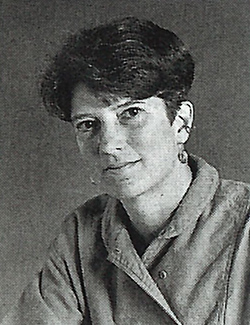
Linda Bierds
“It immediately struck me. I remember asking myself why would they include that particular item in the display? What significance did it have in Darwin’s life?” says Bierds. “Soon after that I found myself asking `What is the significance of this image to me? Why did it touch me?’ ”
It was the work of answering such questions—and countless others a writer must ask in the creative process—that turned the museum’s wig stand into the eloquent opening of Bierds’ most recent book of poetry, The Ghost Trio.
Simple, sometimes unremarkable images to most of us. “That’s almost always how they start,” says Bierds, reflecting on the convergence of life and art that is the heart of great poetry, of great writing in any genre. Listening to Bierds describe a poem’s inception leaves one wondering whether writers are indeed born not made, arriving in the world with some innate literary vision or poetic nature.
Pure talent is, of course, part of the equation, says Bierds. But the new director of the University’s highly acclaimed graduate creative writing program, and her colleagues, stress that it’s a long, hard road from calling to perfection, from initial inspiration to completed text.
It is that road which these teachers—committed artists all—hope to help emerging writers navigate. Their reputation for doing so at the UW has grown steadily in the past decade. As many as 300 would-be writers apply for the graduate program’s 16 annual openings.
In a U.S. News & World Report survey conducted in March, the University’s Masters of Fine Arts program was ranked 10th among 200 creative writing offerings across the nation, tying with programs at Boston University, Washington University in St. Louis and Cornell.
The magazine’s annual review included creative writing graduate programs for the first time in 1997, a year that also marks the 50th anniversary of poetry and fiction writing instruction at the UW.
Following the arrival of poetry master Theodore Roethke in 1947, generations of promising writers have blossomed here under the tutelage of contemporary poets, short-story authors, novelists and essayists: Nelson Bentley, David Wagoner, Colleen McElroy, Charles Johnson, David Bosworth, Shawn Wong and David Shields among them. Noted poets Tess Gallagher, ’63, James Wright and Richard Hugo have all taken seats as students. They have been followed by a cadre of promising writers today, including poets Frances McCue, ’88; and Sean Bentley, 81; and novelists David Guterson, ’78, ’82; and Dan Orozco, ’94.
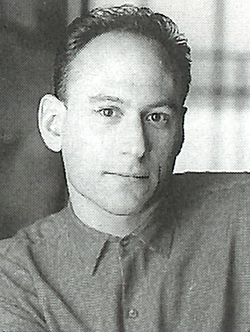
David Shields
“As a faculty we believe we compare to any creative writing faculty in the country,” says longtime instructor David Shields, author of the critically acclaimed novels Dead Languages and Heroes.
Students who enter the M.F.A. program with the naive assumption that it will a) turn them magically and painlessly into writers or b) launch their careers “are in for a rude awakening,” says Elizabeth Dye, a second-year fiction student. Book agents and editors are not likely to flock to your doorstep upon graduation, Dye points out. In fact, waiting tables is likely to net more money than putting pen to paper for years after graduation.
Why, then, do students pledge the considerable cost in both time and money to immerse themselves in a discipline so slow to pay off, if at all? They come because they have something to say, according to Charles Johnson, who holds the S. Wilson and Grace M. Pollock Professorship in Creative Writing.
“They have something to say that they haven’t seen said and their motivation is to say it,” Johnson says, borrowing an idea from Jean Paul Sartre. “This program is part of finding out what it is they have to say that no one else has been able to put down exactly right. It’s the beginning of a lifelong process, of enlightenment.”
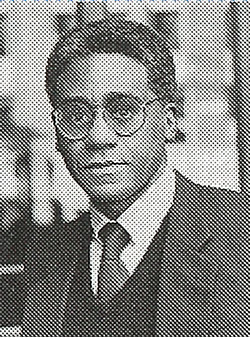
Charles Johnson
“It’s kind of like being in a store where there are tons of clothes but none of them look right to you. You try some on, you look closer but what you need is just not there,” Dye explains. “There is a kind of writing I have never seen before that I want to see so I guess I have to write it. I see this as two years to crystallize that idea of the kind of thing I want to write.”
Many students come because they simply don’t have all the tools necessary to recreate their thoughts and stories on paper. Former student Guterson, winner of the 1995 PEN/Faulkner Award for Fiction wfor his novel Snow Falling on Cedars, is most succinct on this issue. Of the UW creative writing program, Guterson says simply: “It’s where I learned to write.
“Writing is like any other creative process, the components need to be learned,” he says.
In two-hour workshops, students learn step-by-step the skills that transform good writing, or simply good ideas, into great writing: development of interesting characters, well-planned plot, challenging and appropriate symbolism, nuance, metaphor, well-written dialogue. They are urged and pushed to read the work of classic writers as well as fellow students critically and to receive criticism openly. While providing a steadying hand, teachers are careful not to ground students in their own agendas or styles of writing.
“I’ve found guidance when I wanted guidance and freedom when I wanted that,” says student Manju Thapa. “There is no pressure to conform to one style of writing at the expense of my own stylistic impulses. All students are challenged to set their own goals and meet them on their own, which is the only way, perhaps, that writing can be taught. The instructors have an excellent sense of when to push a student and when to leave the student alone.”
Students learn how to ask critical questions of themselves and others, how to challenge opinion and redirect their work in the effort to perfect it. With five instructors in the poetry and five in fiction—not to mention 10 divergent teaching and writing styles—students are in a constant process of redirection and revision.
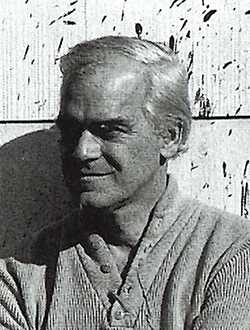
David Wagoner
“Each of us is probably considered individually bizarre or eccentric and yet we balance each other out,” David Wagoner says of the program’s unusually large faculty. Wagoner is author of 26 books of poetry and fiction. He won one of America’s highest poetry honors, the Ruth Lilly Poetry Prize, in 1991.
“I encourage my students not to believe me or take my opinions on faith,” he says. “If they disagree, I tell them to seek other opinions and to offer some reason for their disagreement.”
Defending your work is perhaps the best way to critique it, Thapa says. “By our exposure to each other’s writing and criticism … we not only see the thematic and technical choices our peers have made, but have to defend the choices we have made.”
According to teacher Colleen McElroy, students learn to have a critical eye for what is on the page and how each passage reflects the writer’s intent.
Before analyzing, students must open themselves to affectation: “You read a poem that affects you and for the first five minutes you allow yourself to feel that,” says McElroy, author of eight books of poetry and two collections of short fiction. “Then you must do a closer reading of the work, to find out why the poem impacted you.”
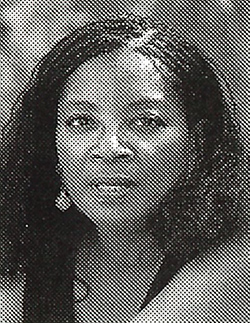
Colleen McElroy
Success as a writer takes complete commitment to the creative process, discipline and intense patience. For no one is that statement truer than McElroy, whose tome What Madness Brought Me Here: Selected Poems, 1968-89 was, as the title suggests, years in the making. Writing, McElroy says, is a need, not a want. “You are hungry for something and you just can’t find it,” she says. “It’s a gnawing presence that, if you don’t write, says to you `You didn’t eat today.’ ”
That’s not to say there aren’t days when you simply go hungry.
“It’s feast or famine for me,” says McElroy, who can spend 15 hours in an undisturbed flurry of words, producing pages of script, or find herself agonizing over a single sentence.
“You have to write everyday,” says English Department Chair Shawn Wong, a novelist who led the creative writing program prior to Bierds.
“I tell my students there is no such thing as writer’s block. By the end of the program, writing will be much harder then it was when you came in. You feel like you are less in charge and you have more tools at hand and more decisions to make. Writing never gets easier for graduates because they demand more of themselves the more they know.”

Shawn Wong
Knowing more is the common pursuit of student and teacher: a self-knowing that enables a writer to recognize his or her own unique vision as a writer. They search for a “voice” or language that is explicitly the writer’s own, created from the writer’s experience of life and his or her experience of other writers’ words.
“Voice is only one trick in a bag of tricks, but to me it is the most important trick,” says Shields. “It has to do with a way of thinking that is uniquely yours. You can find fiction that has a compelling narrative and well-defined characters, but if it doesn’t have a unique sound, it holds no claim on me.
“Voice is the rhetoric of a writer’s way of thinking. Writers must develop a language that is all their own, that conveys to others what their brain sounds like when it’s thinking,” he adds. “Writing, in my opinion, is the closest human beings get to communicating completely with each other. And it’s voice that does that. It’s why I read. It’s why I write.”
McElroy likens the voice of a writer to fingerprinting: “It’s how you leave your mark.”
Even if you find your voice, it takes, on average, 15 years for a serious writer to turn the corner from author-peddler to peddled author. Guterson’s Cedars has sold more than a million copies, but the writer paid his dues in a high school English classroom and published a book of shorter pieces and a book on home schooling before rising to literary star status.
Instead of unrealistic expectations of fast and lucrative literary success, the staff hope graduates leave the M.F.A. program with a sense of ownership in the broader community of working writers. They want former students to take their place in the literary world by continually reading, analyzing and learning from the works of classic and contemporary colleagues and then applying those lessons to their own craft.
“Writing is not a solitary act, it is an act of community,” says graduate Frances McCue, ’88. “The program allowed me to become not only a writer but a literary activist, working to put marginalized works before the public. In a sense, that community has been able to console me in the solitude of writing.” McCue is a poet and executive director of Seattle’s newest garden of literary support, Richard Hugo House, “a community center for readers, writers and audiences.”
“Seriousness of purpose is one of the fundamental things that I learned I needed in the program,” says Guterson.
Who better to instill that lesson than Guterson’s mentor Charles Johnson, whose novel Middle Passage won the 1990 National Book Award. Johnson is purpose personified, a whir of production. During his 21-year tenure here, he has completed several award-winning books, essays and novels. He is a screenwriter, book reviewer and editor of the Seattle Review. Nine months a year he dedicates himself to teaching because, as he says, “I owe it to those teachers who helped me become the writer I am.”
“It’s always a balance,” Johnson says of the creative writing faculty’s ability to teach and consistently produce written works. Watching a student rise to his or her own best writing, is part of each teacher’s definition of personal success.
“To see someone like David Guterson is a great joy to me,” Johnson says. “He’s standing on his own two feet and he did not sell out to do it. Everything he’s done has been in service to his stories.”
That, in essence, is what the creative writing program is all about: graduating students who no longer need the program, with it’s structured, tight environment and instant critic’s circle, to write.
“No teacher can make more demands on you than you can make on yourself,” says Wong. “My hope is that when students leave, they don’t need people like me. The workshop voices are now in your head, you can be brutally honest with yourself as a writer. The best students are the ones who continue to investigate what we’ve taught them long after class is over, when they are not being forced to do it.”
Despite its growing reputation, the creative writing program is far from being on equal footing with programs at other universities when it comes to recruiting. Better funding, especially from private sources, would enable the department to lure high quality students who need financial aid, bring in more visiting scholars, hire a full-time program director instead of passing the torch amongst faculty members, and help to recruit more minority writers, says Wong.
“We’d love to have a post-M.F.A. fellowship that is competitive nationally,” he says. “A writer very early in his or her career doesn’t qualify for a lot of grants or fellowships that published writers can get. This would allow us to get them money when they need it most.”
“It is important for the University community to support creative writing because it’s our best chance of articulating what the future might be,” says McCue. “Support of this program should be parallel with the research sciences. These are the students who will be articulating another, crucial way of looking at the world. They are critical.”